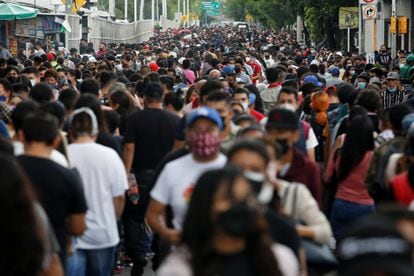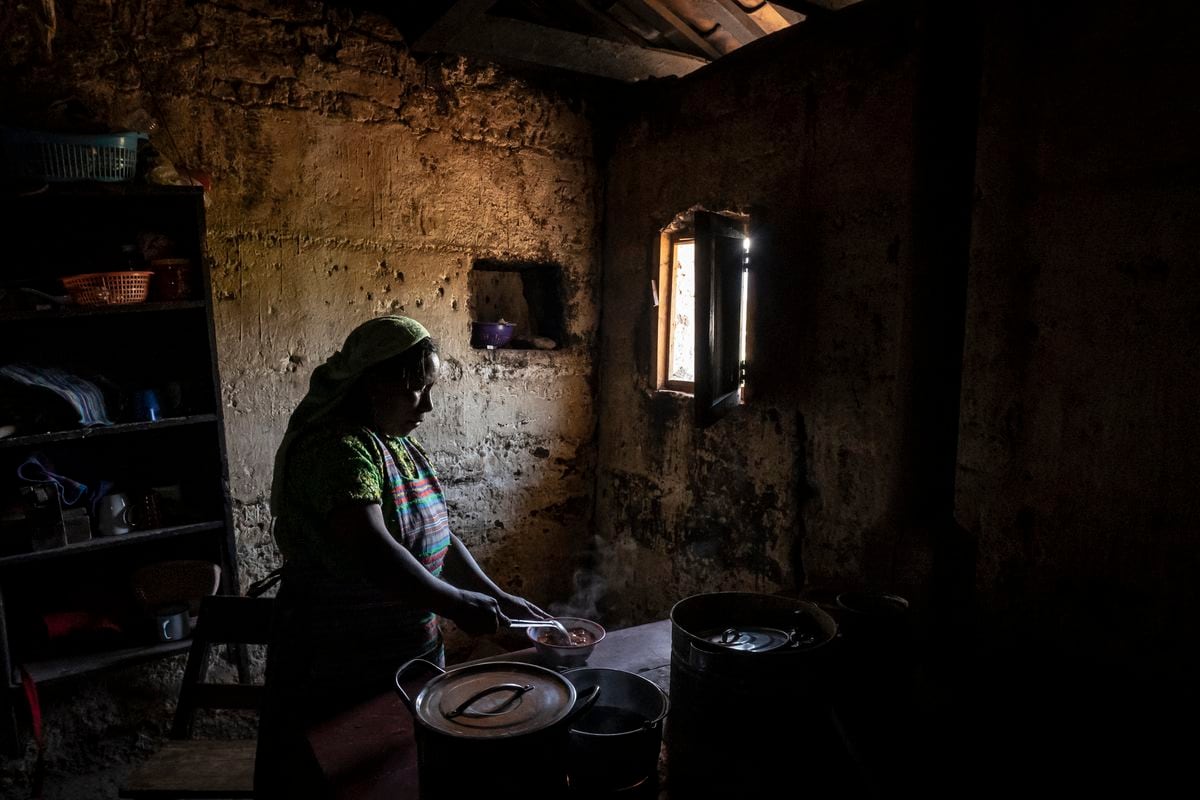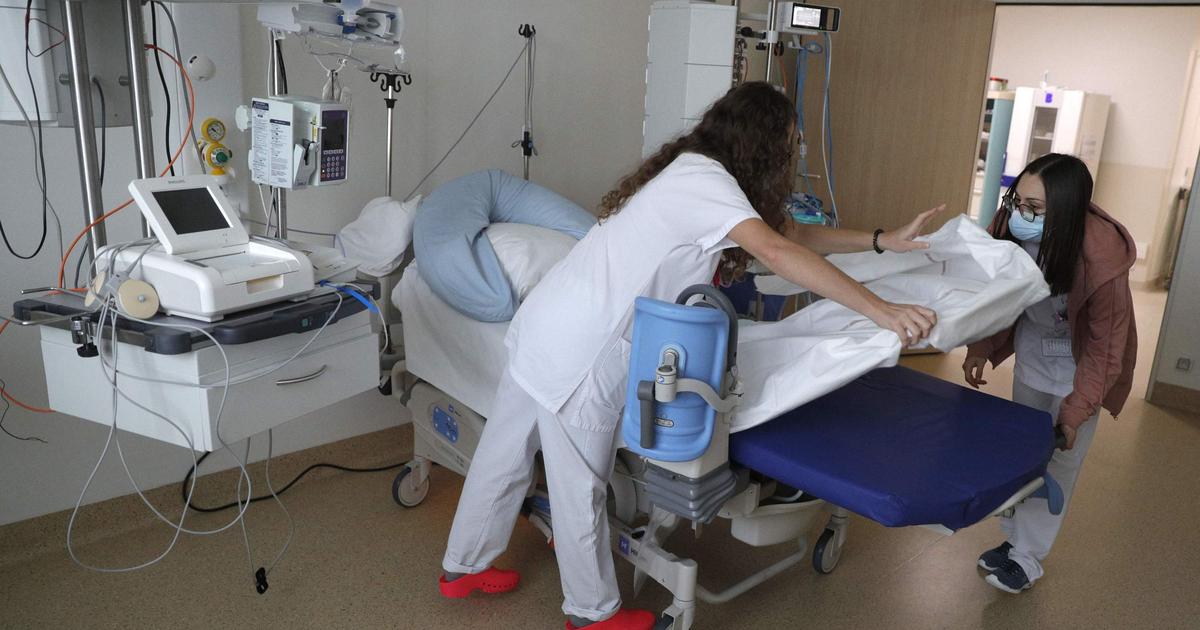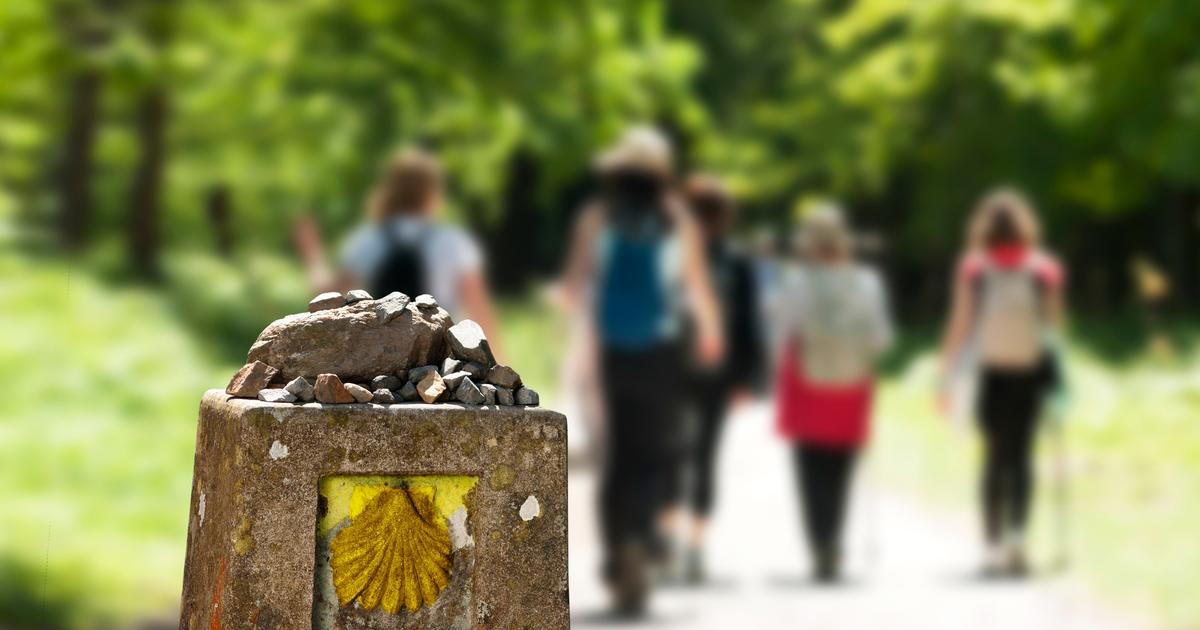Mexico City. Nine in the morning. Glorieta de Los Insurgentes. The second largest city in Latin America is experiencing the onslaught of the third wave of the pandemic with a mixture of resignation and stoicism. In the midst of an apparent tranquility, the access of line 1 of the subway vomits every morning a tide of hurried people who represent every five minutes the choreography of every morning: face masks, hair gel, ties, tailored suit, men's shoes. heel in a bag to be able to walk faster. Some push, freshly painted makeup. It is time to go to work in one of the main financial and economic arteries of the Mexican capital and the Delta variant is the worst dance partner these days among the capitalists.
In recent weeks the influx of office workers has been felt more in the square.
Mrs. Elena from her humble position in the street of Genoa observes how business is better now.
From very early he sells coffee, cakes and sandwiches.
At a table he offers the delicacies that more than one will devour for breakfast.
"I had an advertising flyers company, but for a year we had to cut expenses," says the woman while handing over the change of a turkey horn.
Like Mrs. Elena, millions of people lost their jobs to the pandemic and found a way to get ahead in informality.
Pedestrian crossing on Hidalgo avenue.
ALFREDO ESTRELLA / AFP
As businesses in the area have disappeared, new street vendors selling stew tacos and sweet bread have proliferated.
"Here we go to the day, scratching ourselves with our nails," says Mari, a waitress at the
El Cocinero
restaurant
, one of the few inns that survives around the Mexican Stock Exchange.
A row of closed shutters with the “For rent” or “For sale” sign form a bleak landscape.
In front of a dance school, he tries to stay afloat: "Unlimited salsa classes: one month for 1,000 pesos (about $ 50)."
Mealtime has gotten sadder on a street that was once brimming with life.
"The last weeks that we returned to the orange traffic light, the clientele has fallen again," says the waitress regretfully while she does not raise her eyes from her cell phone.
More information
López Obrador opens the door to vaccinate minors under 18 years of age who require "special protection" against covid-19
Covid-19: the second cause of death in Mexico
Covid-19 vaccination certificate, how to obtain it and what you should know
With more than 19,000 infections a day, the capital has returned to the level of January and therefore, to the color orange. On this occasion, however, the Government of Claudia Sheinbaum has decided not to increase restrictive measures or capacity in shops and restaurants. "There are no adjustments," said the mayor on July 23. The capital on this occasion has decided to bet heavily on vaccination in the hope that mortality will be lower. “In the last week the positivity stabilized. That speaks to the impact of vaccination, ”Sheinbaum said. To date, Mexico has accumulated 2.9 million confirmed infections and more than 241,000 deaths, the fourth highest figure in the world behind the United States, Brazil and India.
Each company has decided to create its own dynamics to return to its activities.
For example, the real estate agency where secretary Marta Ochoa works has decided that only 30% of its staff go to the offices located in the
World Trade Center
, another of the most important financial points in the city.
"At all times we wear face masks and use gel," says the 60-year-old woman.
Despite being vaccinated, Elba Martinez, 34, does not feel “calmer” when she goes to work every other day in a large office building in the Reforma area.
The young woman believes that from now on, society will have to learn to live with the virus.
"I think this is going to be cyclical," she says resigned.
People walk on a street in Mexico City.
GUSTAVO GRAF MALDONADO / Reuters
There are those who, however, have decided not to stop throughout the pandemic. As is the case with the accounting firm where the 29-year-old lawyer Raúl Zarazúa works. "You always have to be working and looking for a way to survive," he says as he straps a black backpack over his blue suit. Less than a month ago Zarazúa had covid-19, but despite this, the lawyer has returned to the street as soon as he has tested negative. "For Mexico to have more development, the only way is to go to work," he emphasizes. "Shined shoes, face masks and to the street."
In response to the increase in infections, the Government of Andrés Manuel López Obrador has expanded the number of hospital beds and has accelerated vaccination so that all people up to 18 years of age are immunized in October. The Executive also does not rule out vaccinating minors of that age now that the return to school has been ordered this August. Since December of last year, in Mexico 68 million doses have been applied and almost 26 million people are already fully vaccinated. 20.5% of the 126 million inhabitants that live in the country. On August 1, most government agencies resumed the return to work of officials who have two doses of the vaccine.
Lilia Jiménez, a 32-year-old nurse who works in a private clinic in the Naples neighborhood, believes that although vaccination is progressing, it is still too early to return to normality. "Few people are vaccinated so that we are protected," he says. According to the Undersecretary of Health, Hugo López-Gatell, 97% of the people hospitalized in this third wave are not vaccinated. "At this rate we are not going to end the virus," says Jiménez. The nurse complains that the metrobus in which she travels for more than an hour every morning goes "all the way up." On the way from south to north, the unit is so full that the doors close with difficulty and you have to “squeeze” with the rest of the travelers as in the old normality.
A QR code inside the bus invites users to register to break the chain of infections, but between pushing, fatigue and little space, the notice goes unnoticed.
If not for the masks, everything looks a lot like a normal day in the capital of Mexico.
Subscribe here
to the
newsletter
of EL PAÍS México and receive all the informative keys of the current situation of this country















